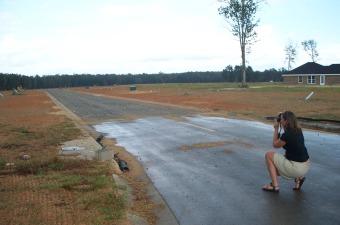
Section Branding
Header Content
Housing Bust Concerns Environmentalists
Primary Content

Just a few years ago, environmentalists had their hands full trying to stop what they saw as rampant development on Georgia's coast.
Now as the housing slump drags on, however, some environmentalists find themselves wishing for a turn-around.
Ogeechee-Canoochee Riverkeeper Chandra Brown stands under an umbrella in the middle of a subdivision where work has stalled near Savannah.
A few lonely homes stick out, but over a space of several football fields, there's nothing but paved cul-de-sacs winding through dirt.
"This is a storm drain," she points out, as the rain falls. "So, when it rains, the water flows into the drain."
And the drain leads to a river, where dirt from lot after empty lot can reduce oxygen levels and kill marine life.
With no protection to keep the drain dirt-free, and other developments like this all over because of the weak economy, it's obvious why some environmentalists now say, the return of construction can't come soon enough.
Tonia Bonitatibus is the Savannah Riverkeeper and describes a scene in Augusta.
"The river was turning bright orange," Bonitatibus says. "So we tracked it down. We got in a canoe and went up."
It turned out that a stalled-out housing development was leaving a big, muddy mess in an area creek.
This reporter called the developer in that case but got no response.
And that's what environmentalists and state officials are getting, too, when they call many hard-luck developers these days.
Catherine Wannamaker of the Southern Environmental Law Center says, her organization sued a Toombs County developer in a run-off case.
"We named a defendant who was a developer and he had not answered," Wannamaker says. "Then, we got a call from a bank saying, 'Oh, we're about to foreclose on that."
It's hard to tell how much the environment is suffering because of the shaky economy.
But even a short list has stalled subdivisions fueling complaints in every coastal county.
And the real estate busts keep coming. The latest is straight from the top of environmentalists' hit list.
"It's about time," says David Egan of the Initiative to Protect Jekyll Island.
Egan has been trying for years to stall a huge development on his beloved state-run island park.
Tuesday, the economy did it for him. Park officials and a private firm cancelled their development agreement.
So is that good news for Egan? Well even here, there are potential consequences.
"We could end up with a situation where visitation doesn't really benefit from this," Egan says.
And visitation keeps the park afloat. The development included what even critics said were needed improvements.
The recession makes much of that uncertain now.
In the end, the problems of stalled out projects won't stop until the housing market turns around.
When it does, Ogeechee Riverkeeper Brown hopes it'll come back smarter.
"It's an opportunity to take those sites, to look at them and say, well, 'Does this really still make sense for us?'" she says. "Is there a way to redesign these places to be more respectful of the environment?"
Environmentalists might find out soon whether a comeback features smart growth.
This week, a top economist told Metro Atlanta's Council for Quality Growth that residential real estate is beginning to show signs of recovery.
Tags: Jekyll Island, Savannah River, environmental issues, housing slump, Ogeechee River, Chandra Brown, Tonia Bonitativus, Catherine Wannamaker, David Egan, Savannah Riverkeeper, Ogeechee-Canoochee Riverkeeper, Southern Environmental Law Center, Initiative To Protect Jekyll Island
Bottom Content

